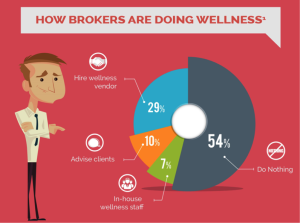Insurance broker involvement in wellness programs is on the rise. In the past insurance brokers may have helped human resources departments select and negotiate the best insurance plans for their workforce. But with the introduction of the Affordable Care Act and the incentives that are geared toward employee wellness, a broker’s job role is expanding. Now just how far that expansion reaches is still dependent on the broker. The graph below is taken from
RAND’s latest employer survey and breaks down the involvement levels that different insurance brokers have in their clients’ wellness programs.
3 Main Ways Insurance Brokers are Involved in Wellness
- Do Nothing Brokers- Over 50% of brokers chose to do nothing in relation to their clients’ wellness programs. While this is the most prevalent approach, it may not be advisable. From a business growth and consultative partnership approach to client relationships, getting active in your clients’ wellness program might be the key to future business and longevity. If you want to be a transactional broker who has client turnover from year to year, involvement in wellness programs may not be for you, but if you want to create long-term client relationships and exceed expectations…keep reading.
- Hire Wellness Vendors- 29% of insurance brokers assist clients in hiring a wellness vendor. The broker vets the vendor and brings them in once the insurance deal is done. This shifts responsibility for the accomplishment of client metrics from the broker to the vendor and the client. It allows the vendor to provide added value for clients without creating direct accountability, and without liability, to help clients reach certain milestones. Additionally, hiring a wellness vendor allows brokers to bring in real wellness program experts. As wellness programs grow and expand, along with the addition of incentives related to the Affordable Care Act, it’s important to have true experts guiding a clients’ program to ensure success within government guidelines.
- Advise Clients on Wellness Programming- 10% of brokers chose to get more involved in their clients’ wellness program by offering advice. This allows brokers to have that trusted partnership level with clients without committing to metrics. It also allows brokers to build long-term relationships without committing to the development and execution of a plan that’s out of their wheelhouse. Advising clients' usually involves identifying resources that they can use to build out their program and ensure its success, without the obligation of continued counseling and monitoring. This approach is like providing a playbook without coaching the actual game. It can build trust, without monopolizing broker time.
No matter what level of involvement brokers take in their clients' wellness programs it's safe to say the wellness isn't going anywhere. And as the year goes on and incentives and rewards continue to cement themselves in this space, so do the legalities and conditions that go along with them. So how do you think the
RAND pie chart will change in the coming year?









